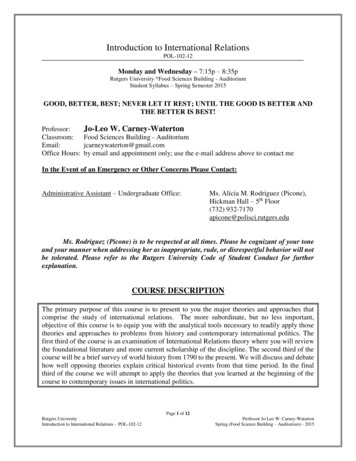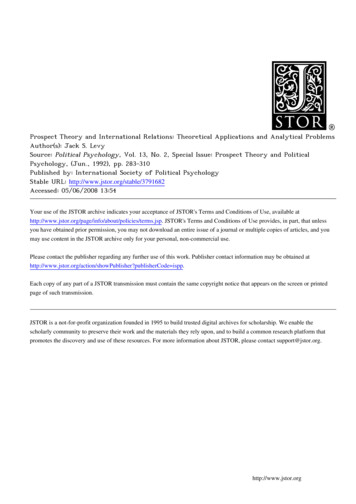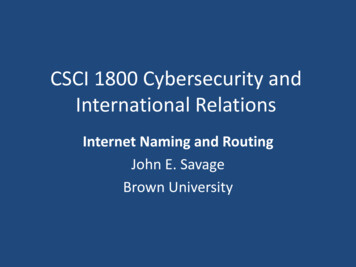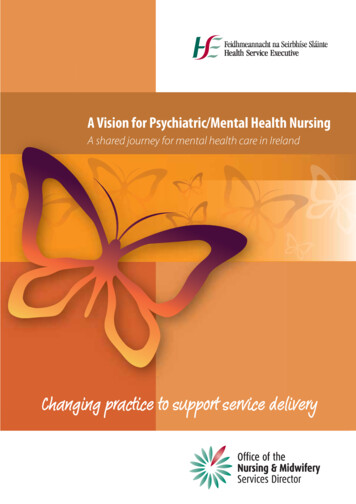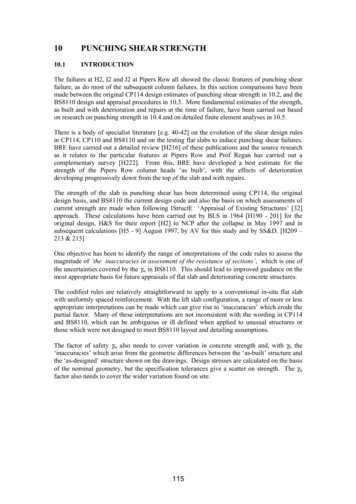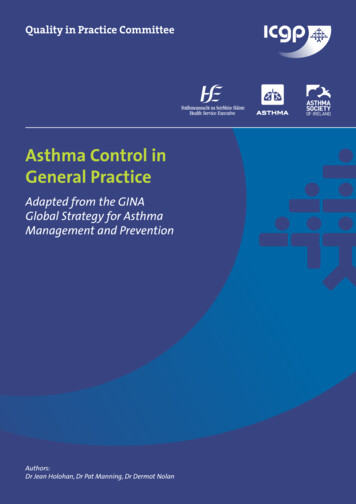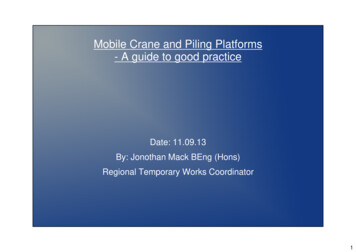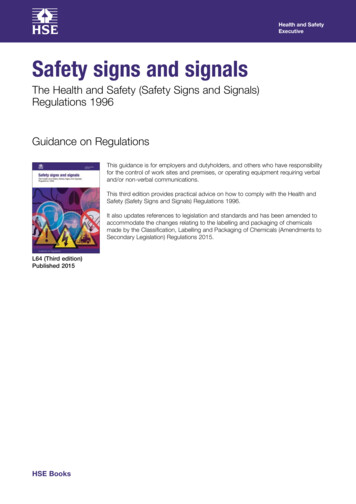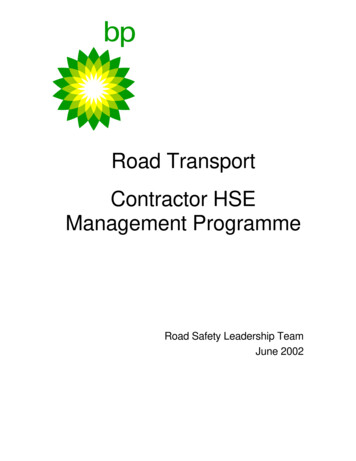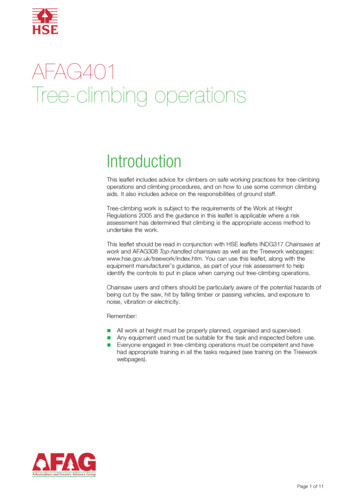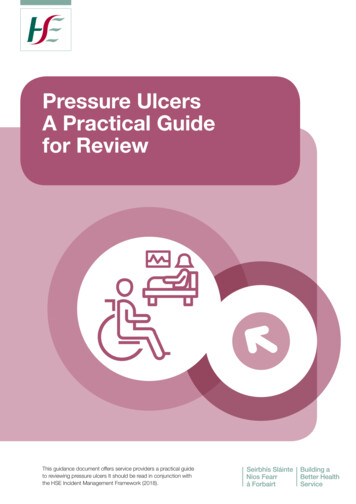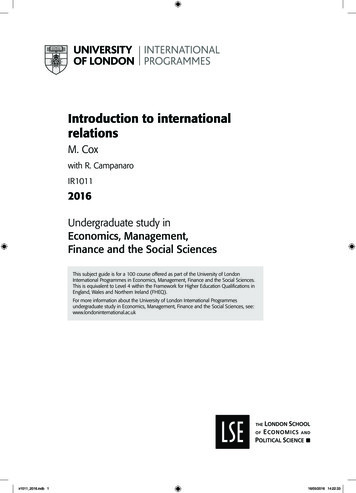
Transcription
Introduction to internationalrelationsM. Coxwith R. CampanaroIR10112016Undergraduate study inEconomics, Management,Finance and the Social SciencesThis subject guide is for a 100 course offered as part of the University of LondonInternational Programmes in Economics, Management, Finance and the Social Sciences.This is equivalent to Level 4 within the Framework for Higher Education Qualifications inEngland, Wales and Northern Ireland (FHEQ).For more information about the University of London International Programmesundergraduate study in Economics, Management, Finance and the Social Sciences, see:www.londoninternational.ac.ukir1011 2016.indb 116/05/2016 14:22:33
This guide was written for the University of London InternationalProgrammes by Professor Michael Cox, Emeritus Professor of InternationalRelations, London School of Economics and Political Science.Professor Michael Cox is also director of LSE IDEAS, which, in 2015, wasranked third in the world of the best university-affiliated think tanks.The author and editor of over 25 books, he has held appointments atuniversities across the world. He is currently visiting professor at LUISS School of Governmentin Rome and the Catholic University of Milan. Professor Cox has also held several seniorprofessional positions in the field of international relations, including director of the DavidDavies Memorial Institute for the Study of International Politics, University of Aberystwyth;chair of the European Consortium for Political Research (ECPR); associate research fellowat Chatham House, London; and senior fellow, Nobel Institute, Oslo. He also serves on theeditorial board of several academic journals and has been editor of several leading journalsin IR, including: The Review of International Studies and International Relations. He is noweditor of Cold War History, International Politics and two successful book series: Palgrave’sRethinking World Politics and Routledge’s Cold War History. Professor Cox is a well-knownspeaker on global affairs and has lectured in the USA, Australia, Asia and countries in theEU. He has spoken on a range of contemporary global issues, though most recently he hasfocused on the role of the USA in the international system, the rise of Asia, and whether ornot the world is now in the midst of a major power shift.The alterations made to 2016 edition of this guide were spearheaded by Dr RichardCampanaro, based on feedback from past students of IR1011. Dr Campanaro currentlysplits his time between providing online educational support for the University of LondonInternational Programmes and lecturing in the Political Science Department of the Universityof Prince Edward Island (UPEI), Canada. He is an adjunct faculty member of the UPEI Instituteof Island Studies, and continues to work on a variety of projects in international relations andpublic education.This is one of a series of subject guides published by the University. We regret that dueto pressure of work the authors are unable to enter into any correspondence relating to,or arising from, the guide. If you have any comments on this subject guide, favourable orunfavourable, please use the form at the back of this guide.University of London International ProgrammesPublications OfficeStewart House32 Russell SquareLondon WC1B 5DNUnited Kingdomwww.londoninternational.ac.ukPublished by: University of London University of London 2016The University of London asserts copyright over all material in this subject guide except whereotherwise indicated. All rights reserved. No part of this work may be reproduced in any form,or by any means, without permission in writing from the publisher. We make every effort torespect copyright. If you think we have inadvertently used your copyright material, please letus know.ir1011 2016.indb 216/05/2016 14:22:34
ContentsContentsIntroduction . 1Introduction to the subject area . 1Route map to the subject guide . 1Syllabus. 2Aims of this course . 2Learning outcomes . 3The structure of this guide . 3Overview of learning resources . 4Online study resources . 14Examination advice. 15Part 1: Introduction . 17Chapter 1: The origins of international relations . 19Aims of the chapter . 19Learning outcomes . 19Essential reading . 19Further reading and works cited. 19Chapter synopsis . 20Introduction: IR is born from the ashes of war . 20The interwar years (1919–1939): the twenty years’ crisis . 21Standing on the shoulders of giants: international political philosophy before 1920 . 22Application: using political philosophy to understand the world . 26Conclusion . 29Overview of chapter . 29A reminder of your learning outcomes. 29Chapter vocabulary. 30Test your knowledge and understanding . 30Part 2: The history of international relations . 31Chapter 2: Empires and international society from 1500 to 1914 . 33Aims of the chapter . 33Learning outcomes . 33Essential reading . 33Further reading and works cited. 33Chapter synopsis . 34Introduction . 34Empires and hierarchy: Europe’s imperial expansion . 35From the Long Peace to the First World War . 37The First World War . 39Conclusion . 40Chapter overview . 41A reminder of your learning outcomes. 41Chapter vocabulary. 42Test your knowledge and understanding . 42iir1011 2016.indb 116/05/2016 14:22:34
IR1011 Introduction to international relationsChapter 3: The short 20th century from 1919 to 1991. 43Aims of the chapter . 43Learning outcomes . 43Essential reading . 43Further reading and works cited. 43Chapter synopsis . 44Introduction . 44Self-determination and the decline of imperialism . 45Power and polarity from 1919 to 1991: from multipolarity to bipolarity . 46Global governance: building international organisations in a world ofsovereign states . 49Conclusion . 51Chapter overview . 51A reminder of your learning outcomes. 52Chapter vocabulary. 52Test your knowledge and understanding . 52Chapter 4: The post-Cold War world . 53Aims of the chapter . 53Learning outcomes . 53Essential reading . 53Further reading and works cited. 53Chapter synopsis . 54Introduction . 55The USA’s unipolar moment: 1991–2001 . 55Great powers in post-Cold War international society. 57Whatever happened to the global South? . 60International society and the war on terror . 62Conclusion . 64Chapter overview . 64A reminder of learning outcomes . 65Chapter vocabulary. 65Test your knowledge and understanding . 65Chapter 5: Globalisation and the evolution of international society . 67Aims of the chapter . 67Learning outcomes . 67Essential reading . 67Further reading and works cited. 67Chapter synopsis . 68Introduction . 69Globalisation to the end of the Cold War. 70Globalisation and US unipolarity . 72Globalisation and the international political order . 73Thinking again about globalisation . 74The double crisis of globalisation?.
Introduction to international relations M. Cox with R. Campanaro IR1011 2016 Undergraduate study in Economics, Management, Finance and the Social Sciences
